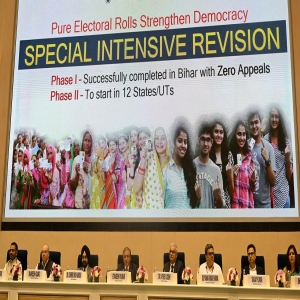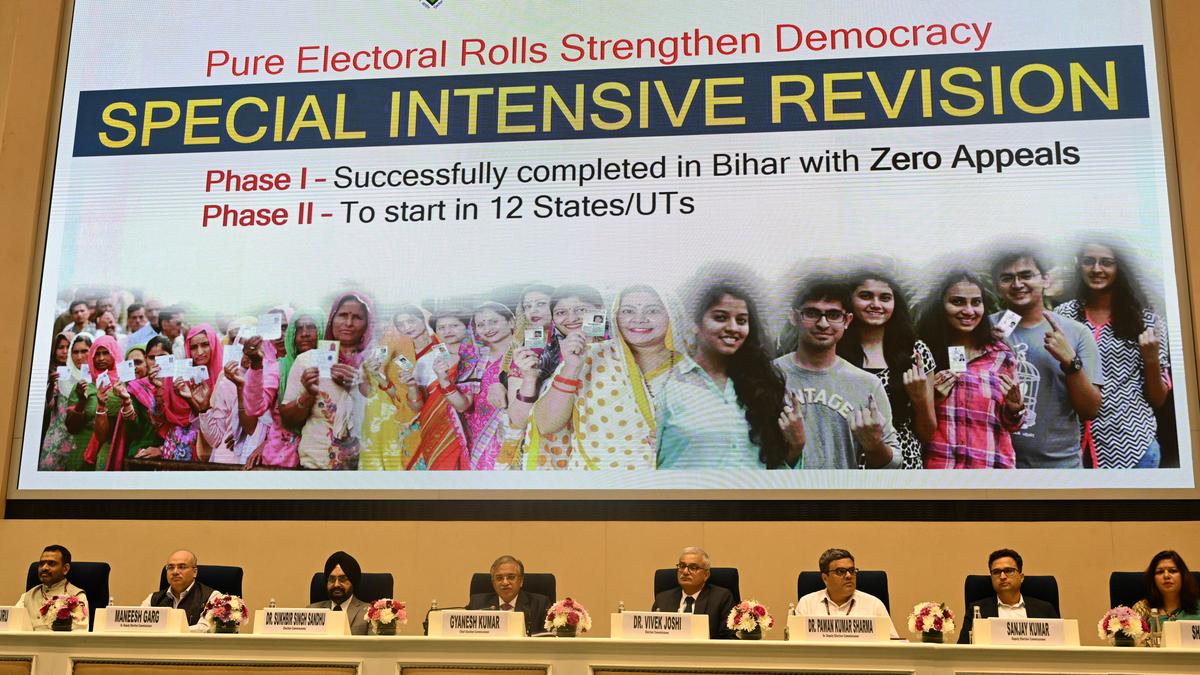
.jpg) Isaac Gomes
Isaac Gomes

According to Anandabazar.com (October 24, 2025), the Election Commission of India (ECI) is on the verge of finalising its preparations for the Special Intensive Revision (SIR) of the West Bengal voters' list, which will go to the polls (Assembly Elections) in 2026. It plans to complete the revision of the voters' list to ensure that the West Bengal elections are held based on the final voters' list of the SIR.
This process was adopted for the Bihar Assembly Elections (scheduled to be held on November 6 and 11, 2025). With this in mind, the SIR date will soon be announced. All District Election Officers (DEOs) have been instructed to stay on their toes as SIR could begin at any moment.
Why a sudden SIR?
Every year, the ECI revises the voters' list by (1) registering new voters (based on Form 6), (2) excluding the names of dead and fake/illegal voters and (3) publishing a new list based on (1) and (2). But it feels the process isn't error-free and that the loopholes need to be plugged.
One reason is that over the last 10-15 years, the ECI hasn't conducted any in-depth scanning and revision of the voters' list nationwide. In West Bengal, the last such exercise was done in 2002. Hence, it was felt that an SIR needs to be conducted and a new list published, ensuring that no genuine voter is left out and no single illegal voter is on the list.
Regarding the revision now, the ECI says that there is no hard and fast timeline for SIR and that it can be done whenever deemed necessary. The opposition parties, including Congress (INC) and Trinamool (TMC), however, say that SIR is nothing but the BJP's brainchild to disenfranchise voters. That is why SIR is being done after so many years.
On the other hand, the BJP pushes the narrative that about one crore "intruders/infiltrators" who entered India from Bangladesh and Myanmar are on the voters' list and need to be identified and deleted from the voters' list. In other words, implement their 3D policy of Detect, Delete and Deport.
Documentary requirements?
According to ECI sources, the SIR in West Bengal will be conducted in the same manner as it was in Bihar, barring a few changes. Booth Level Officers (BLOs) will deliver an enumeration form to every voter's (as of 2025) house. Along with that form, any of the 11 documents specified by the ECI must be submitted.
Voters whose names appear on the 2002 voters' list in West Bengal will not have to submit any documents; their names will be included straightaway in the SIR list. Besides the 11 specific documents, for SIR, the Supreme Court of India has stated that the Aadhaar card should also be accepted as the 12th document as proof of identity.
The accepted documents are as follows:
1. An identity card showing that you have worked as a central or state government employee or are receiving a pension.
2. Any document issued by a bank, post office, LIC, or local administration before July 1, 1987.
3. Birth certificate.
4. Passport.
5. Secondary or Higher Secondary Educational Certificate (Madhyamik, ICSE, Ucchya Madhyamik, ISC, SSE or SSC).
6. Residence certificate issued by the competent authority of the State Government.
7. Forest Rights Certificate.
8. Caste/OBC Certificate.
9. Smart Card issued by the Registrar General of India (RGI) under the National Population Register (NPR).
10. Family Register issued by the local administration.
11. Land or house title deed.
According to a Supreme Court order (Monday, September 8, 2025), claim forms for the Special Intensive Revision (SIR) can be submitted with any of the 11 originally listed documents or an Aadhaar card as proof of identity. The Supreme Court emphasised that the goal of the SIR is "mass inclusion" and not exclusion, and urged the Election Commission to accept Aadhaar and EPIC as valid identity documents. Therefore, a clear gap exists between the Supreme Court version and the ECI version.
Who will receive the enumeration forms?
After SIR is announced, the ECI will send a soft copy of the enumeration form to the portal of the Electoral Registration Officers (EROs) from Delhi. These forms will then go for printing. Subsequently, everyone whose name appears on the current voters' list will receive the form. Ninety per cent of the voter's information, including his/her EPIC number, name, address, and date of birth, will already be printed on the form. The commission will print two forms per voter.
Currently, of an estimated population of 10.56 crore, the number of voters in West Bengal is about 7.65 crore. Based on this figure, 15.30 enumeration forms will be printed. The Booth Level Officers (BLOs) will deliver the forms to each voter's home. The blank portions of the form must be completed and submitted along with the required documents. One form will remain with the concerned voter. The other (counterpart) will be collected by the BLO.
Who is likely to be deleted from the voters' list?
The ECI may delete the names of voters whose names do not appear in the 2002 voters list and who have failed to prove their Indian citizenship by providing one of the 11 documents specified by the ECI. The names of all deceased individuals and those of illegal voters will also be deleted.
Names of those who have migrated elsewhere or whose names are in two places with two EPIC numbers will be deleted from one state. Those who have been enrolled as voters by false documents are 'illegal voters' (mainly illegal migrants from Bangladesh and Myanmar).
The commission believes that even if any of the 11 documents can be created by tampering, the persons concerned will not be able to show the names of their fathers or mothers in the 2002 voters' list. Naturally, then questions will arise about their citizenship. If they cannot prove that they are citizens of India, their names will be deleted.
How many will be removed from the voters' list?
Some officials estimate that close to one crore names could be deleted from the final version of the voters' list. Their hunch is that if every year (from 2002 to 2025) is considered, the total of voters who have died and gone elsewhere will be at least 75 lakh. In addition, if illegal voters in the last 23 years are considered, the number could exceed one crore. However, this is a ballpark figure.
Can new voters be registered?
Yes. People whose names are not on the current voters' list will have to register by applying in Form No. 6 of the ECI. They will not get an SIR enumeration form.
What happens if one doesn't participate in the SIR?
If a voter doesn't participate in SIR, their name will be removed from the new list to be published by the ECI in 2026, and they will not be able to vote in the next assembly elections. Therefore, participation in SIR is not optional.
What is SIR mapping?
From 4.58 crore listed voters in 2002 in West Bengal, the current voters' list shows 7.65 crore - an increase of three crore. Based on this, the ECI, through its District Level Officers (DLOs), Electoral Registration Officers (EROs) and BLOs, will do mapping of voters whose names are in both the 2002 and 2025 voters' lists.
Those whose names appear in both lists have been 'mapped,' that is, they have been identified as genuine voters and Indian citizens, including their family members. No document is required as proof of their citizenship. Although 'mapping' is being done in Bengal, the ECI didn't do this in Bihar.
Where can the 2002 list be found?
The list has been published on the West Bengal Chief Electoral Officer's (CEO) website https://ceowestbengal.nic.in/roll_dist. The list is published according to the then-constituency assembly. Voters can check whether their names are included in the polling station. If necessary, voters can take help from the booth-level agents of the political parties.
How will the SIR list be published?
In the case of Bihar SIR, the ECI completed the main work within a month. After that, the draft voters' list was published. The ECI then checked whether there were any mistakes or complaints on the deletion of names from the draft voters' list. The final list was published about a month after the draft list. The same procedure will be followed in West Bengal.